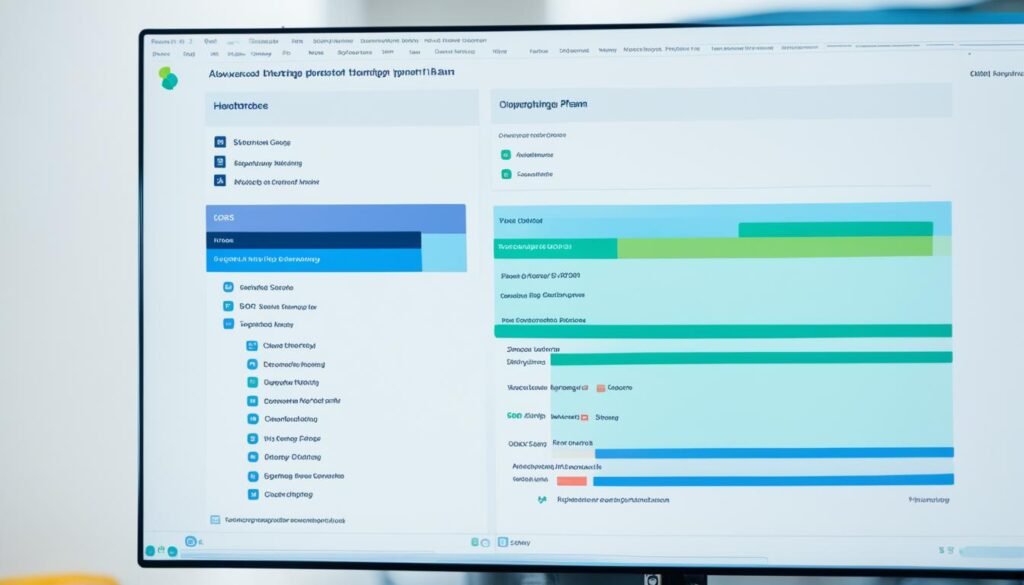When it comes to establishing an online presence, selecting the right web hosting provider is crucial. Shared hosting is a popular option for individuals and small businesses looking for an affordable and accessible solution. However, with so many hosting companies and plans available, choosing the best shared hosting provider can be overwhelming. In this article, we will guide you through the process and help you make an informed decision.
Before diving into the selection process, it’s essential to understand your specific website needs. Consider factors such as the type and purpose of your website, the anticipated traffic, platform requirements, necessary features, security level, and budget. Assessing your website needs will help you narrow down your options and choose the most suitable shared hosting plan.
Once you have a clear understanding of your website requirements, it’s time to research and compare different hosting providers. Look for reliable and reputable companies by checking customer reviews and assessing their legitimacy through guarantees and certifications. Compare the key features offered by each hosting provider, such as multiple data centers, migration options, domain name offerings, and email services. Additionally, ensure that the hosting provider offers dedicated support channels, like live chat, email, phone, and comprehensive knowledge base resources.
After evaluating the key features, it’s important to find the right plan that meets your specific needs. Consider factors such as pricing, storage, bandwidth, and the type of hosting (shared hosting, VPS hosting, cloud hosting) that aligns with your website requirements and budget. Finding the right plan will ensure that your website runs smoothly and efficiently.
Key Takeaways: Best Shared Hosting Provider
- Understanding your website needs is essential before choosing a shared hosting provider.
- Research and compare different hosting providers to ensure their legitimacy and key features.
- Check for dedicated support channels offered by the hosting provider.
- Choose a plan based on pricing, storage, bandwidth, and the type of hosting that aligns with your needs.
- By following these steps, you can choose the best shared hosting provider for your website.
Understanding Your Website Needs
Before choosing a shared hosting provider, it’s crucial to understand your specific website needs. By carefully considering the following factors, you can make an informed decision that aligns with your goals.
Determining the Purpose of Your Website
Start by identifying the purpose of your website. Are you creating a personal blog to share your thoughts and experiences? Or are you setting up an online store to sell products? Understanding the primary function of your website will help you determine the type of hosting service and features that are necessary.
Evaluating the Project Scope
The project scope refers to the scale and complexity of your website. For example, if you’re a freelance web developer handling multiple client sites, you’ll need a hosting provider that offers the flexibility to manage multiple domains. Consider the number of websites you plan to host and choose a provider that can accommodate your needs.
Estimating Website Traffic
Estimating the potential website traffic is crucial for selecting a hosting provider that can handle the expected volume. Assess your target audience, marketing strategies, and projected growth to gauge the traffic levels your website may experience. This estimation will help ensure that your chosen provider offers sufficient bandwidth and resources.
Choosing the Right Platform
Decide whether you want a self-hosted website or a hosted platform. A self-hosted website gives you more control but requires technical expertise. Hosted platforms offer convenience and simplicity but limit certain customizations. Ensure that the shared hosting provider supports your preferred platform, whether it’s WordPress, Joomla, or another Content Management System (CMS).
Assessing Necessary Features
Consider the specific features your website requires. For example, if you plan to sell products, check if the hosting provider offers e-commerce functionality and secure payment gateways. Depending on your website’s purpose, you may need features such as a website builder, email integration, or database support. Identify these necessary features to narrow down your hosting options.
Evaluating Security Requirements
The level of security needed for your website depends on the type of data it handles. If you collect personal information or process online payments, prioritize a hosting provider that offers SSL security and advanced measures to safeguard sensitive customer data. Assess your security requirements to ensure your website remains protected from potential threats.
Setting a Budget
Define a budget for your hosting services to manage your expenses effectively. Consider your long-term spending capacity and weigh it against the features and performance offered by different hosting providers. It’s important to strike a balance between affordability and the quality of service you require.
Understanding your website needs is a crucial step in choosing the best shared hosting provider. By taking the time to assess your website’s purpose, project scope, traffic estimation, platform choice, necessary features, security requirements, and budget, you can make an informed decision that sets your website up for success.
| Factors to Consider | Summary |
|---|---|
| Purpose of Your Website | Determine the primary function of your website, such as a personal blog, online store, or business landing page. |
| Project Scope | Evaluate the scale and complexity of your website, considering the number of sites you plan to manage. |
| Website Traffic Estimation | Estimate the potential traffic your website may receive to ensure the hosting provider can support the expected volume. |
| Platform Choice | Decide between a self-hosted website or a hosted platform, considering the level of control and customization you require. |
| Necessary Features | Identify the specific features your website needs, such as e-commerce functionality or a website builder. |
| Security Requirements | Assess the level of security needed to protect sensitive customer information or data on your website. |
| Budget | Set a budget for hosting services to manage your expenses effectively and prioritize affordability. |
Researching and Comparing Hosting Providers
When choosing the best shared hosting provider for your website, it’s crucial to conduct thorough research and compare different options. Proper research helps you assess the legitimacy of hosting providers and select the one that offers the right combination of features and support. Here are some essential steps to follow when researching and comparing hosting providers:
- Read Customer Reviews: Look for hosting provider reviews on reputable platforms like HostAdvice and Trustpilot. These reviews give you insights into real user experiences and can help you gauge the reliability and performance of different hosting providers.
- Check for Money-Back Guarantee or Free Trial: To make an informed decision, it’s advisable to choose a hosting provider that offers a money-back guarantee or a free trial. This allows you to try their services risk-free and determine if they meet your expectations.
- Contact Customer Support: Assess the responsiveness and effectiveness of a hosting provider’s customer support by reaching out to them with inquiries or concerns. Prompt and helpful responses are indicative of a provider’s commitment to customer satisfaction.
- Utilize Online Tools: Take advantage of online tools such as Sitechecker that help you list and compare web hosts based on their technology, features, and performance. These tools provide valuable insights and make it easier to evaluate different hosting providers.
- Analyze Pros and Cons: Make a shortlist of three main hosting providers based on your research and analysis. Create a table comparing the pros and cons of each provider, considering factors like pricing, features, customer support, and reputation. This will help you narrow down your choices and make an informed decision.
By following these steps, you can gather valuable information, compare different hosting providers, and ultimately choose the best shared hosting provider that aligns with your website’s needs and requirements.
Checking Key Features
When comparing hosting providers, it’s crucial to check their key features to ensure they meet your website’s requirements. Here are some essential features to consider:
Data Centers
Look for hosting providers with multiple data centers located worldwide. Having data centers in different regions improves website performance by reducing latency and providing faster loading speeds for visitors.
Migration Option
If you’re planning to transfer your website from an existing hosting provider, consider whether the hosting provider offers a seamless migration option. This feature ensures a smooth transition of your website without any disruptions or technical issues.
Domain Name
Check if the hosting provider offers domain name registration services or supports domain names you already own. Having your domain name registered with the same hosting provider can simplify website management and streamline your online presence.
Email Service
Ensure that the hosting provider offers reliable email service capabilities. Look for professional email addresses associated with your domain name, which adds a level of professionalism and brand consistency to your communication with clients and customers.
SSL Security
SSL (Secure Sockets Layer) security is crucial for protecting sensitive information transmitted between your website and its visitors. Verify that the hosting provider offers SSL certificates and ensures secure data transmission to enhance trust and security for your website users.
Backup Services
Website data can sometimes be lost due to various reasons. It’s essential to choose a hosting provider that offers regular backup services to safeguard your website’s data. This ensures that you can restore your website to a previous working state in the event of data loss or server issues.
Bandwidth
Assess the bandwidth provided by the hosting provider to accommodate the amount of traffic your website is expected to receive. Sufficient bandwidth ensures that your website can handle simultaneous user requests without experiencing slow loading times or performance issues.
Storage Space
Evaluate the storage space offered by the hosting provider to determine if it meets your website’s storage requirements. Sufficient storage space ensures that you can store all necessary files, media, and databases without running into storage limitations.
By carefully considering these key features, you can choose a hosting provider that aligns with your website’s needs and provides the necessary resources for optimal performance and user experience.
Looking for Dedicated Support
Dedicated support is a crucial factor to consider when choosing a shared hosting provider. You want to ensure that you have access to various support options, so any issues or inquiries can be promptly addressed. Here are some key support options to look for:
- Live Chat: Look for hosting providers that offer live chat support. This customer service approach allows for quick responses and immediate assistance.
- Email Support: Email support is another valuable option. It’s suitable for non-urgent issues, providing a written record of your communication.
- Phone Support: Phone support allows for verbal explanations and direct interaction with customer support representatives. It can be especially helpful for complex issues that require more in-depth discussions.
- Knowledge Base: Check if the hosting provider has a comprehensive knowledge base with frequently asked questions (FAQs) and industry-related tutorials. This resource can help users solve common issues independently.
It’s also beneficial to look for customer support reviews. This helps assess the quality and responsiveness of the hosting provider’s support services. Positive reviews indicate reliable and dedicated support, ensuring you have the assistance you need when you need it.
Overall, finding a shared hosting provider that offers dedicated support options like live chat, email, phone, and a robust knowledge base will give you peace of mind knowing that help is available whenever necessary.
Finding the Right Plan

Finding the right plan is crucial when choosing a shared hosting provider. You need to consider various factors such as pricing, storage, bandwidth, and the type of hosting that best suits your website’s needs.
Pricing: Evaluate the pricing plans offered by different hosting providers. Take into account your budget and the value that each plan offers.
Storage and Bandwidth: Assess the storage space and bandwidth requirements of your website. Consider the size of your files and the amount of traffic you expect.
Hosting Types: Shared hosting, VPS hosting, and cloud hosting are the most common options. Here’s a brief overview of each:
| Hosting Type | Description |
|---|---|
| Shared Hosting | Affordable option for low to medium-traffic sites like personal portfolios and blogs. |
| VPS Hosting | Provides dedicated partitions on the same server for better performance and stability. |
| Cloud Hosting | Offers scalable resources and consistent uptime for growing websites. |
Consider the pros and cons of each hosting type to determine which one aligns best with your website’s needs.
By carefully evaluating the pricing plans, storage and bandwidth options, and hosting types offered by various providers, you can find the right plan that meets your requirements and fits within your budget.
Understanding the Types of Web Hosting

Understanding the different types of web hosting is crucial when choosing the best shared hosting provider for your website. Each type offers unique features and benefits that cater to specific website needs. Let’s explore the various types of web hosting:
1. Shared Hosting
Shared hosting is the most common and affordable option. It involves multiple websites sharing resources on the same physical server. With shared hosting, you have limited control over server settings but benefit from cost-effectiveness. It is suitable for small to medium-sized websites with moderate traffic.
2. VPS Hosting
VPS (Virtual Private Server) hosting offers a partitioned server environment, providing improved performance, stability, and control. It simulates a dedicated server experience at a lower cost. VPS hosting is ideal for growing websites that require more resources and customization options.
3. Managed WordPress Hosting
Managed WordPress hosting is designed specifically for websites built with WordPress. It offers specialized features and optimizations to enhance the performance and security of WordPress sites. Managed WordPress hosting providers handle updates, backups, and other technical aspects, allowing website owners to focus on content creation.
4. Dedicated Hosting
Dedicated hosting provides a physical server exclusively for your website. This option offers maximum reliability, security, and control but comes at a higher cost. Dedicated hosting is suitable for high-traffic websites, large e-commerce platforms, or applications that require robust resources and customization.
5. Cloud Hosting
Cloud hosting utilizes a virtual network of interconnected servers to ensure consistent uptime and scalability. It offers flexible resource allocation, allowing websites to seamlessly handle traffic spikes and scaling needs. Cloud hosting is ideal for businesses and websites that experience fluctuating traffic and require high availability.
Understanding the different types of web hosting helps you make an informed decision when choosing the best shared hosting provider for your specific website needs. Evaluate the benefits and limitations of each type to determine the most suitable option for your website.
| Hosting Type | Features | Price Range |
|---|---|---|
| Shared Hosting | Multiple websites sharing resources on a server | Low Cost |
| VPS Hosting | Dedicated partitions for improved performance and control | Moderate-High Cost |
| Managed WordPress Hosting | Optimized for WordPress sites, automatic updates and backups | Moderate-High Cost |
| Dedicated Hosting | Exclusive access to a physical server for maximum control | High Cost |
| Cloud Hosting | Virtual network of servers for scalability and high availability | Flexible Pricing |
When To Upgrade Your Hosting Plan?

Ensuring optimal website performance requires knowing when to upgrade your hosting plan. In this section, we will discuss the key indicators and considerations that indicate it’s time to upgrade.
1. Website Growth: If your website experiences significant growth in terms of traffic or content, it may outgrow the resources provided by your current hosting plan. Upgrading to a higher plan allows your website to handle increased traffic and accommodate additional content without performance issues.
2. Traffic Spikes: Consistent traffic spikes can put a strain on your hosting resources, leading to slower loading times and potential downtime. If your website consistently faces traffic spikes, upgrading to a hosting plan with better scalability and resources can ensure smooth performance even during peak periods.
3. Scalability: As your website continues to grow, scalability becomes crucial. Upgrading your hosting plan to a higher tier provides you with the flexibility to expand your website and adapt to increasing demands. It allows you to accommodate higher traffic volumes and seamlessly integrate new features and functionalities.
4. Performance Issues: If you notice performance issues such as slow loading times, frequent crashes, or limited server resources, it’s a sign that your current hosting plan may not be sufficient. Upgrading to a plan that offers more resources and better performance can resolve these issues and ensure a seamless user experience.
Regularly evaluate your website’s requirements and monitor its performance to determine when an upgrade is necessary. Consult with your hosting provider to discuss the available options and select the most suitable plan for your website’s needs.
Significance of Upgrading Your Hosting Plan
| Indicators | Why Upgrade? |
|---|---|
| Website Growth | Ensure your website can handle increased traffic and content. |
| Traffic Spikes | Maintain optimal performance during high-traffic periods. |
| Scalability | Accommodate future website expansion and increased demands. |
| Performance Issues | Resolve slow loading times, crashes, and limited resources. |
FAQs

Frequently asked questions (FAQs) provide additional information for those looking to choose the best shared hosting provider. FAQs address common queries and concerns regarding web hosting services, helping readers make informed decisions. Below are examples of frequently asked questions:
1. Where are the servers located?
The server’s location can impact website performance and loading speeds. Hosting providers may have multiple data centers around the world to minimize latency. It’s essential to choose a hosting provider with server locations that align with your target audience’s geographic location.
2. Are website backup options available?
Website backups are essential for safeguarding your data. Check if the hosting provider offers regular backups to protect against data loss. Some providers may include automated backup services in their hosting plans, while others offer manual backup options.
3. How often is server maintenance performed?
Server maintenance helps ensure the stability and security of your website. Inquire about the hosting provider’s maintenance schedule to understand how it may affect your site’s availability and performance. Look for providers that conduct regular maintenance during off-peak hours to minimize disruptions.
4. What security measures are in place?
Website security is crucial to protect against cyber threats. Hosting providers should offer measures such as SSL certificates, firewalls, and malware scanning to safeguard your website and visitors’ data. Additionally, inquire about their security protocols and any guarantees they provide regarding data protection.
5. What is the server speed?
Server speed directly impacts website performance and user experience. Choose a hosting provider that offers fast and reliable servers, minimizing loading times and ensuring smooth navigation. Look for providers that utilize state-of-the-art infrastructure and content delivery networks (CDNs) to optimize speed.
6. What is the server uptime guarantee?
Server uptime is vital to ensure your website is accessible to users at all times. Hosting providers typically offer an uptime guarantee, which denotes the percentage of time their servers are operational. Look for high uptime guarantees, preferably above 99%, to minimize website downtime and loss of potential visitors.
Providing readers with helpful answers to these FAQs enhances their understanding of web hosting and facilitates their decision-making process. By addressing common concerns, individuals can make informed choices when selecting a shared hosting provider.
The best shared web hosting services of 2024 in full:
The Best Shared Hosting Services of 2024
Shared Hosting vs. VPS Hosting
What Is the Difference Between Shared Hosting and WordPress Hosting?
Each server is optimized for speed and limited to how many clients can operate on each server. This powerful combination of resources, performance enhancements, and limited occupancy means an industry
Looking to enhance your Shared Hosting experience?
Short on Time? Check Our Top Shared Hosting Providers
Choose the Best Shared Hosting Plan For You
Conclusion
Choosing the best shared hosting provider is essential for optimizing your website’s performance and ensuring its success. By carefully considering your website needs, conducting thorough research, and comparing key features, you can make an informed decision that aligns with your goals and budget.
When determining your website needs, assess factors such as project scope, anticipated traffic, platform requirements, necessary features, security level, and budget. This will help you understand the specific requirements that your shared hosting provider should meet.
Next, research and compare different hosting providers based on legitimacy, customer reviews, and key features such as data centers, migration options, domain names, and email services. Look for a hosting provider that offers dedicated support channels like live chat, email, phone, and comprehensive knowledge base resources.
Finally, find a suitable plan that matches your pricing expectations, storage and bandwidth requirements, and the type of hosting that best suits your website’s needs. By following these steps, you can confidently choose the best shared hosting provider, optimize your website, and set it up for success.
FAQs
Q: What is shared hosting and why should I consider it?
A: Shared hosting is a type of hosting service where multiple websites share resources on a single server. It is a cost-effective option for small businesses or personal websites that don’t require dedicated server resources.
Q: How do I choose the best shared hosting provider for my needs?
A: To choose the best shared hosting provider, consider factors such as uptime guarantees, customer support, pricing, scalability, and included features like disk space, bandwidth, and security measures.
Q: What are some key features to look for in a shared hosting service?
A: Some key features to look for in a shared hosting service include reliable uptime, 24/7 customer support, adequate storage and bandwidth, security measures like SSL certificates, easy-to-use control panel, and additional perks like free domain registration.
Q: Is shared hosting suitable for high-traffic websites?
A: Shared hosting may not be the best option for high-traffic websites as resources are shared among multiple sites on the same server, which can lead to performance issues during peak traffic times. Consider a VPS or dedicated hosting for high-traffic websites.
Q: What is the difference between shared hosting and other types of hosting services?
A: Shared hosting shares server resources with other websites, while VPS (Virtual Private Server) hosting provides dedicated resources within a shared environment. Dedicated hosting offers an entire server for one website, and cloud hosting uses cloud infrastructure for flexible resource allocation.
Q: Can I upgrade from shared hosting to a different hosting plan in the future?
A: Yes, many hosting providers offer scalable options that allow you to easily upgrade from shared hosting to VPS or dedicated hosting as your website grows and requires more resources.
Q: What are some reputable shared hosting providers in 2024?
A: Some reputable shared hosting providers in 2024 include A2 Hosting, InMotion Hosting, Bluehost, SiteGround, and HostGator. Consider reading reviews and comparing features before choosing a provider.




